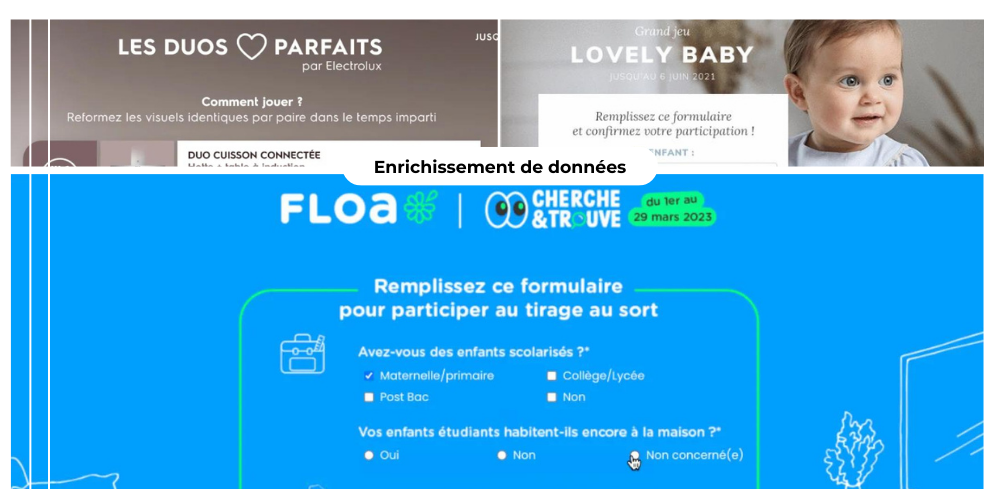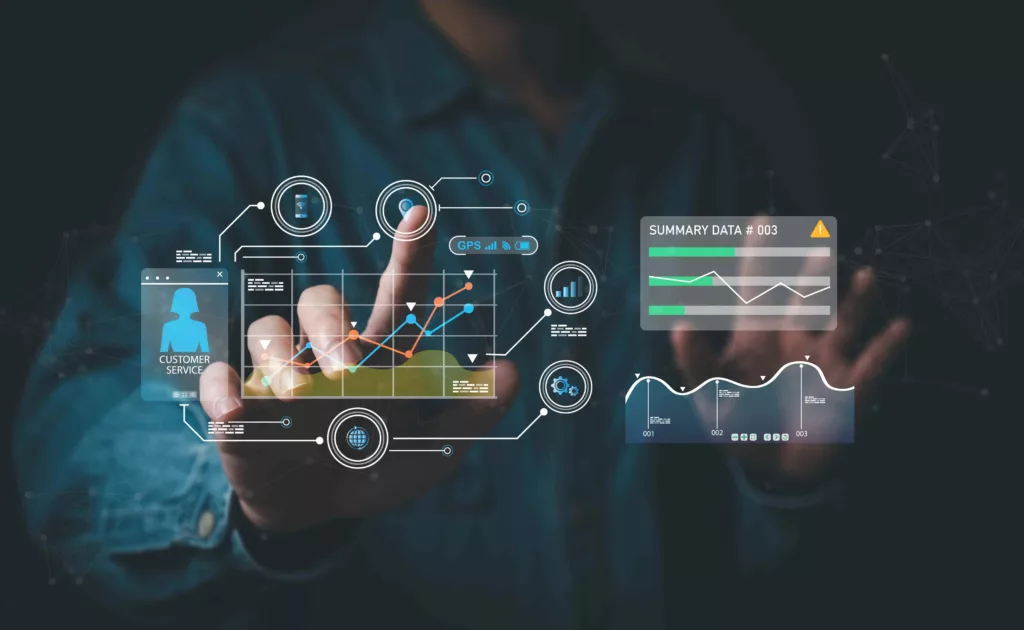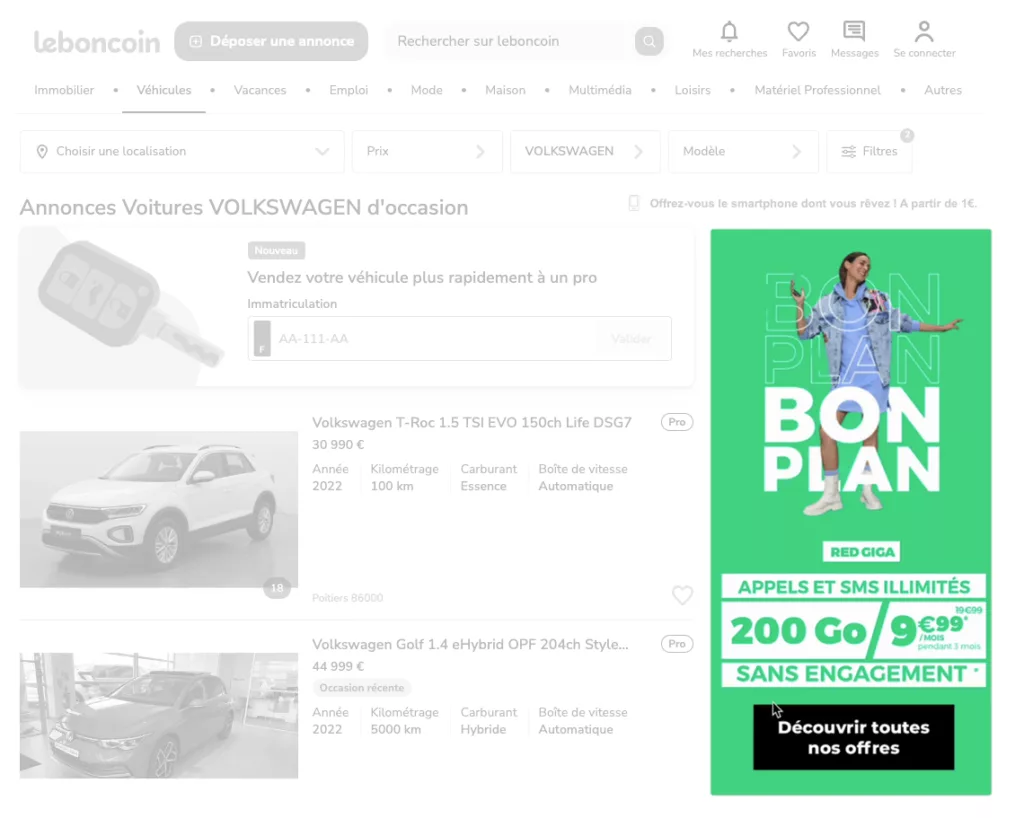In a constantly evolving digital world, data enrichment has become an imperative for companies constantly seeking innovative ways to optimise and improve the quality of their databases. Data collection and enrichment are crucial to understanding customers, personalising offers and improving the effectiveness of marketing campaigns. This is especially true when the end of third-party cookies is approaching, so enriching your database is becoming essential.
In this article, we look at the benefits of data enrichment and how gamification can be an effective way of achieving your objectives. We will then explore three exemplary campaigns run by our customers: Cyrillus, Floa Bank and Electrolux. These examples show us how a data collection strategy has enabled these companies to re-qualify their databases and improve their conversion rates.
Data enrichment: maximising customer understanding
Data enrichment plays a fundamental role in modern digital marketing, enabling brands to deepen their understanding of customers and optimise their strategies. However, as the industry evolves, brands are facing new challenges, including the disappearance of the third-party cookies from Google.
An in-depth understanding of our customers.
Third-party cookies are doomed to disappear. This is when first-party and zero-party data, i.e. data collected directly from customers by the companies themselves, is becoming increasingly valuable.
By collecting detailed data in-house, brands can gain a more accurate and reliable view of their customer base. This in-depth understanding enables companies to personalise their marketing campaigns, offer tailored products and services and strengthen customer loyalty.
Optimisation of personalisation.
Although 37% of users refuse third-party cookies, consumers still expect personalised experiences. The solution lies in data enrichment. Collected directly from consumers, it offers brands the opportunity to optimise the personalisation of their offers.
With accurate customer data, companies can create targeted content, product recommendations and exclusive offers tailored to individual preferences. This increases engagement, as well as customer satisfaction.
Improving the effectiveness of marketing campaigns.
Enriched, accurate data enables brands to design more effective marketing campaigns, thanks to data segmentation. En comprenant les caractéristiques démographiques, les comportements d’achat et les intérêts de leur public, les entreprises peuvent cibler les bons segments de marché, ajuster leurs messages et optimiser leur budget publicitaire. Cela se traduit par une meilleure conversion des prospects en clients.
Strengthening customer loyalty.
When brands really understand their customers and respond to their needs, they also strengthen customer loyalty. Les clients se sentent valorisés et compris, ce qui les encourage à rester fidèles à la marque. Des offres personnalisées basées sur des données enrichies peuvent également inciter les clients à effectuer des achats récurrents, renforçant ainsi la relation client-marque sur le long terme.
Data enrichment is thus becoming an essential asset for brands wishing to remain competitive and establish authentic connections with their customers in an ever-changing digital landscape. By intelligently combining first-party, zero-party data and data enrichment, companies can successfully navigate current and future challenges, ensuring strong customer-brand relationships based on relevance.
In this new environment, data enrichment is emerging not only as an essential strategy, but also as the very foundation of customer understanding in the digital age.
Gamification for data enrichment
In the digital marketing landscape, gamification is emerging as an innovative and effective strategy for enriching corporate data while engaging users in a fun way. This clever approach transforms data enrichment into an interactive and rewarding experience for users, while offering companies valuable opportunities to gather relevant information.
Gamification involves the use of game mechanics such as challenges, rewards and competitions in non-game contexts. By integrating these elements into data collection process, brands can arouse the interest and enthusiasm of users, inviting them to share valuable information.
The interactive games and online competitions, such as quizzes or memory games, for example, can be designed to collect useful data while users are actively participating. For example, by proposing relevant questions within a quiz linked to a product or service, brands can obtain direct answers from participants, thereby enriching their customer understanding.
The strategic use of gamification for data enrichment therefore offers a dual benefit: it allows companies to collect relevant data while increasing user engagement and satisfaction. By creating fun, interactive experiences, brands can build deeper connections with their audience, while enriching their database for effective marketing campaigns!
The Cyrillus Interactive Form: exceptional data enrichment
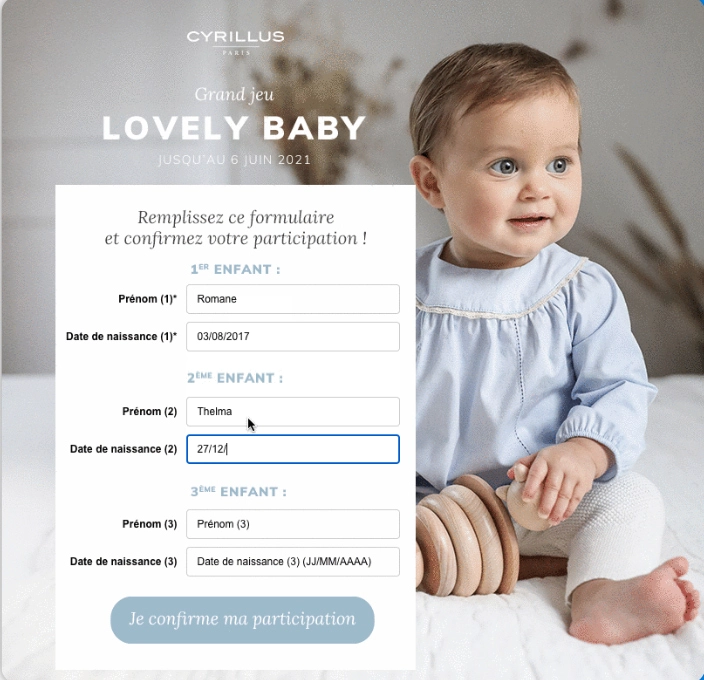
Cyrillus, aiming to reach young mothers effectively, has opted for a campaign based on a form with a prize draw at the end of the game. Thanks to this strategy, Cyrillus succeeded in enriching its database by more than 65%, collecting crucial information such as children’s first names, dates of birth and missing telephone numbers.
This campaign enabled Cyrillus to personalise its offers and optimise its communication with its target clientele. By better understanding the specific needs of young mothers, Cyrillus was able to tailor its marketing in a more targeted way, thereby increasing its conversion rate significantly.
Floa Bank’s enriched form: the power of brand awareness and personalisation
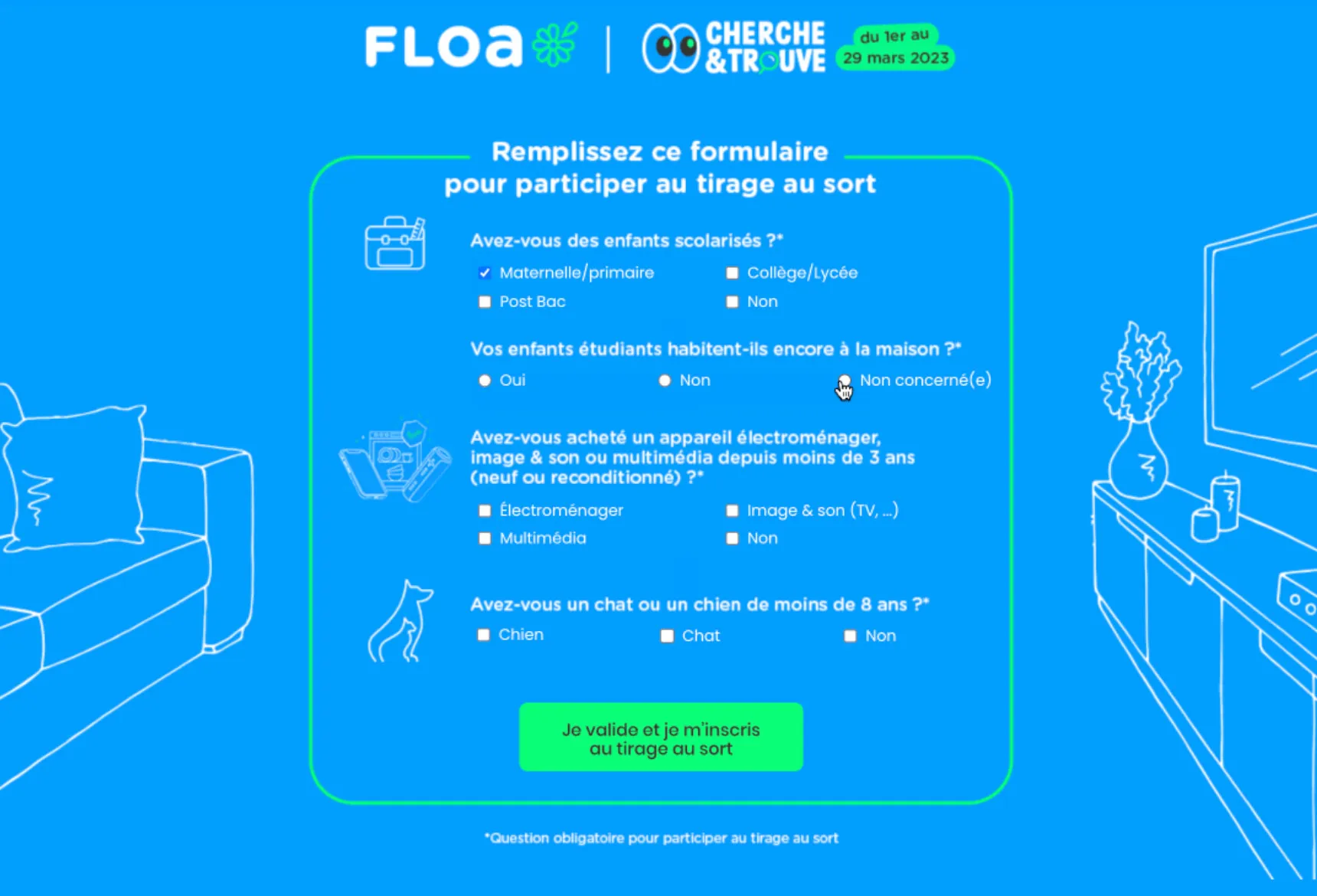
Floa Bank has launched a Hidden Object campaign to boost its visibility and personalise its insurance products. Cette campagne interactive a captivé ses participants avec une durée moyenne de jeu dépassant la minute. Un taux d’opt-in de 48% a été atteint, offrant à Floa Bank une opportunité précieuse de effectively target registered users for future interactions and offers.
With 4 categories of data enriched in a second form, the collection of qualified data has enabled Floa Bank to improve its personalisation and optimise its services to meet the needs of its customers. Using the information collected, Floa Bank has been able to create tailor-made insurance products, thereby strengthening the confidence of its customers.
Electrolux media and Memory: a memorable Valentine’s Day campaign
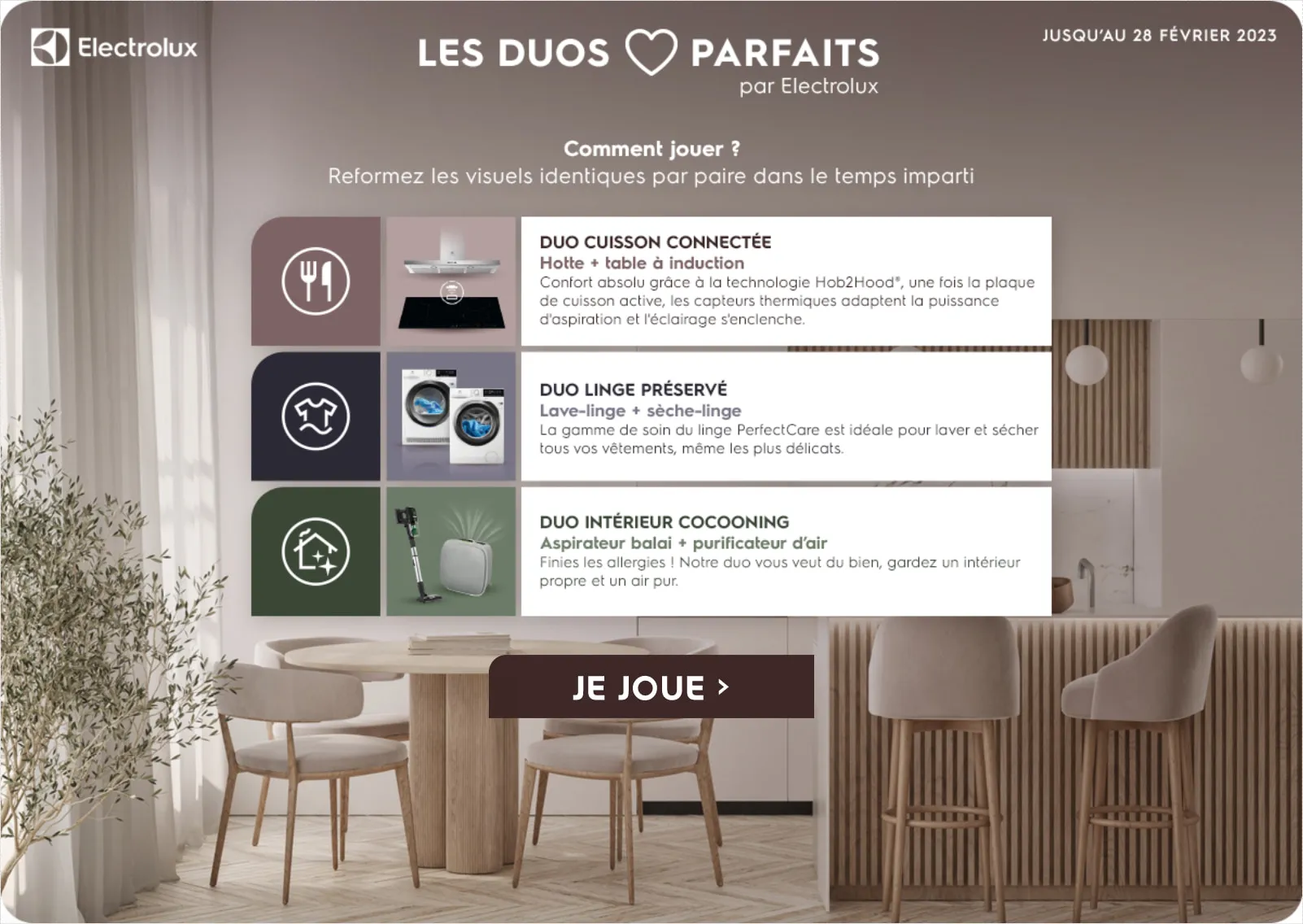
Electrolux launched an innovative campaign for Valentine’s Day, using the mechanics of Memory combined with media via Adictiz Ads.. Cette campagne 100% gagnante, offrant des bons de réduction, a généré 1,5 million d’impressions. L’objectif principal était l’enrichissement des données, et grâce à cette stratégie, Electrolux a atteint un taux d’opt-in remarquable de 50,17%.
This enriched first-party data have enabled Electrolux to better understand its customers, optimise future marketing efforts and strengthen customer loyalty. The data collected was also used to personalise Electrolux’s future promotional messages, ensuring maximum relevance for each customer and increasing the likelihood of subsequent conversions.
Conclusion
Innovative data collection campaigns from Cyrillus, Floa Bank and Electrolux illustrate the crucial importance of data enrichment in the world of digital marketing. By using interactive campaigns, these companies have succeeded in re-qualifying their databases, improving their visibility and optimising their conversion rates.
Integrating gamification into data enrichment strategies represents a bold and innovative step for companies seeking to understand their customers while offering an engaging user experience. By transforming a process that is often perceived as tedious into an interactive adventure, brands can gather relevant information in a fun and effective way!
Intelligent data collection is not just about quantity, but also about the quality of the information gathered. These case studies highlight the effectiveness of well-designed campaigns to enrich its database, paving the way for deeper and more meaningful customer relationships in an era where the collection of third-party cookies will no longer be relevant.


